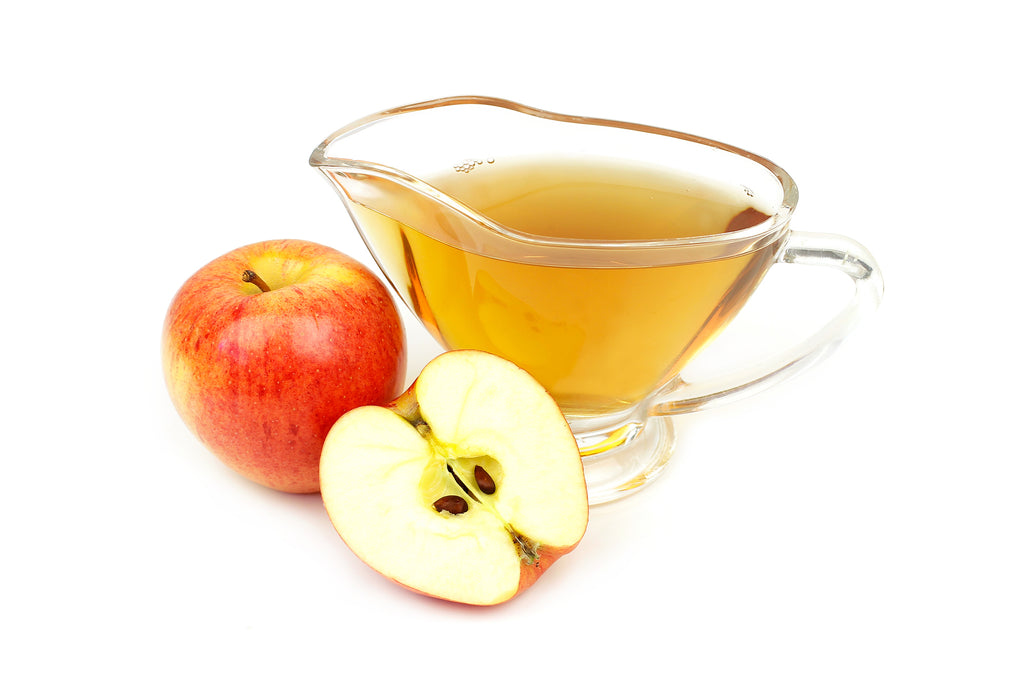Apple Cider Vinegar - the pros and cons of a daily ACV shot
18th April 2019 / Health
Apple Cider Vinegar - the pros and cons of a daily ACV shot
Zoe Milkowski

Apple cider vinegar, or ACV for short, is exactly what it says on the tin (or bottle) - a vinegar made from the juice of fermented and crushed up apples. It has a long documented history of use in traditional medicine as a treatment for a number of ailments ranging from skin infections to common coughs and colds. It is even claimed that Hippocrates, the “Father of Modern Medicine” used ACV to clean wounds and relieve coughs. The proposed immune-boosting and healing power of ACV however, is not contained in the whole body of the vinegar, but is thought to lie in an active component of the natural, unfiltered form, known as “The Mother”.
It all sounds a bit ominous, doesn't it?...
“The Mother” is simply the proposed active part of the ACV and is a cobweb-like, cloudy looking substance that can be seen floating in unfiltered and unpasteurised forms of ACV. The Mother is made up of cellulose and the acetic acid bacterial colonies responsible for the beneficial health benefits of the vinegar. It is formed naturally as a part of the vinegar-making fermentation process. The Mother is considered to be a probiotic and therefore, if you are looking to introduce ACV into your diet or health regime, it is important to choose a raw and unfiltered version of the vinegar that explicitly states it contains “The Mother” component. If you choose a filtered version you will just be drinking a very sour version of apple juice (with a very similar nutritional profile).
So, what are the proposed health benefits of incorporating a daily shot of ACV?
1. Probiotic potential
As previously mentioned, The Mother component of the ACV is made up of millions of healthy bacteria awarding it probiotic status. These gut-friendly bacteria have the potential to improve your digestion and keep things running smoothly. ACV could even provide symptomatic relief from digestive issues such as indigestion or acid reflux. The healthy bacteria in the ACV work to fight any harmful bacteria in the stomach and neutralise excess acid.
2. Immune system support
The healthy, probiotic bacteria in the ACV also have the potential to do wonders for your immune system. Studies have shown that good gut health and a strong immune system come hand in hand. Therefore by incorporating a daily intake of raw ACV, you are helping to boost your immunity.
3. Blood sugar control
One American study found that when participants were given 20 grams of ACV after a meal of a buttered bagel and orange juice, their post-meal blood glucose levels were seriously lowered when compared with placebo. Several other studies have also reported similar findings. While we are by no means suggesting that ACV could treat diabetes, it may have the potential to lower blood glucose levels and prevent blood sugar spikes.
There are also other ways of using ACV and reaping the rewards from it…
1. As a salad dressing
Using a simple vinaigrette recipe (ACV, lemon juice, raw honey, olive oil) added to your salad leaves you can incorporate a good dose of healthy bacteria into your lunchtime meal. The added ACV also provides antibacterial properties to your salad leaves and can get rid of any harmful germs on your food.
2. As a skin toner
We’ve already said that traditionally, ACV was used for treating skin infections and thanks to its natural antibacterial character there is definite proof that it can be beneficial for your skin. As with all of these ACV uses, you must remember to dilute the vinegar as it is very strong. A suggested dilution for a facial toner may be 1 part ACV to 2 parts filtered water. Try the diluted mix on a small section of skin and wait to see how your skin reacts to it, before putting it all over your face.
The cons…
Overall ACV can be seen as a safe addition to a health regime, however as with any supplemental food there may be some negative drawbacks with consistent use.
- Due to its high acid content, ACV could erode your tooth enamel if drunk every day. Be sure to dilute it with lots of water and drink water after taking it. You could even try drinking it with a straw to really limit its contact with your teeth.
You could also choose to incorporate it into your meal (as a dressing or as part of a marinade or sauce ingredient) rather than drinking it. This will reduce the risk of tooth decay.
- Being a highly acidic drink, it has the potential to worsen acid reflux and people with existing digestive problems should always consult their doctor before adding in a new supplement.
Probiotics the Link Way
If you want to add some probiotic power into your diet, without the possible negative drawbacks listed above, why not try our Symbiotic 7 supplement? Containing both a prebiotic and probiotic, our symbiotic provides you with everything needed for a healthy gut. If you’d like to find out more about why prebiotics are almost just as important as the probiotic bacteria themselves then check out our “Prebiotics and Probiotics Explained” blog post by nutritionist Laura Tilt.
From The Blog
-

25th February 2025 / Health
Empowering Women’s Health: Key Supplements for Well-being
Women’s health is a lifelong journey, with each stage presenting unique nutritional and wellness needs. From maintaining energy levels to supporting hormonal balance and bone health, the right comb...
Read article -

17th February 2025 / Health
Empowering Women’s Health: Lifestyle Tips and a Key Supplement for Perimenopause and Menopause
NaomiWomen’s health evolves through various life stages, and the transition into perimenopause and menopause brings unique challenges. During these phases, hormonal fluctuations can lead to symptom...
Read article -

10th February 2025 / Health / Products
The Best Foods and Drinks to Help Your Body Recover from Burnout
Burnout is a growing issue in today’s fast-paced work culture, leaving many people feeling exhausted, overwhelmed, and depleted. While rest and self-care are essential, nutrition plays a crucial ro...
Read article




